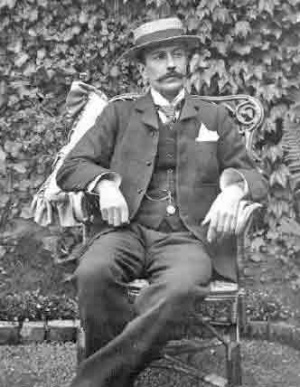The Royal Court and public morals
The Royal Court had not only to intervene to protect the farming interests, it had also to step in to protect the morals of the people. As knitting was a purely mechanical work of the hands, the minds and tongues of the workers were free and unshackled.
Nocturnal depredations
On dispersing from the gatherings, some disguised with masks would go rollicking along from house to house and commit nocturnal depredations to the annoyance of the peaceful citizens. It would appear that at these parties dissolute songs were sung and stories of doubtful propriety related.
A curious Act of the Court, dated 22 June 1615, tells how a certain Philip Picot was prohibited from knitting in the company of girls in order to avoid scandal and it was ordained that if he must knit he should do so alone and in his own home. Without the fascination of the fair it is highly probable that our worthy abandoned the gentle art of knitting.
It was fortunate indeed for our forefathers that the Royal Court was always at hand to guard over their morals. And be it said the Royal Court did not shrink in those days from its duty. A Court which had passed an ordinance whereby ladies had to give security that they would hold their tongues, was not likely to stop at anything.
In October 1619 a certain Catherine Le Sauteur was convicted of having dressed and masqueraded as a man. She was condemned to be placed in the stocks, but that was not all that happened to the unfortunate lady. The Court ordered that the breeches she had worn were to be exhibited beside her. A punishment truly made to fit the crime.
If we may judge by the large number of ordinances to be found on the Court Rolls, it would appear that the lower classes in those days were neither well-behaved nor law abiding. Any and every occasion seems to have been seized to depart from the straight path. Even the excellent sport of sand-eeling furnished an excuse.
Sandeeling
Poingdestre, writing in 1682, says that sandeeling "was wont to be a great pastime for young people who flocked to it, not so much for the fish, as for divertissement, and many times for debauchery for which cause these meetings have been discountenanced and are at present less frequented".
A century before Poingdestre wrote, on 6 September 1589, the Royal Court had passed an Ordinance with reference to sand-eeling parties, which prohibited women and girls from going sandeeling without being accompanied by their husbands or parents.
Nor do our forefathers seem to have been as careful of observing the Sunday as a day of rest, as they might have been, or as the Court thought proper. On 11 October 1589 the people were prohibited from playing a game called jeu de quilles on Sundays. This being disallowed they took to other games and so on 25 March 1597 La Justice went one better and prohibited all games on Sundays.
On 14 May 1603 a similar ordinance was proclaimed in the Market Place, with the addition that all taverns were to be closed.
| Previous | Next | |
| Trade | Court and morals | Policing |

